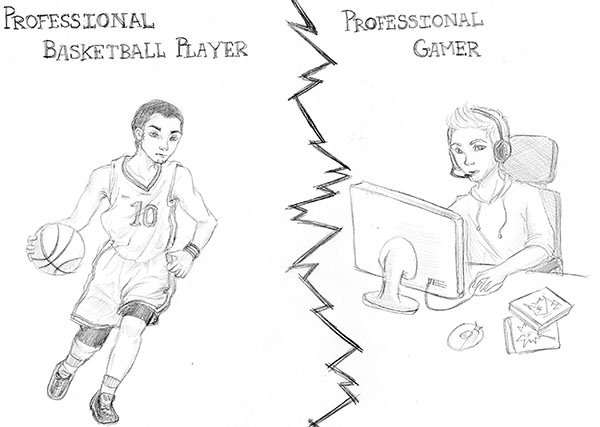Student gamers challenge labels, overcome stereotypes
May 27, 2016
The many different worlds of video games are filled with obstacles and puzzles designed to challenge both the player’s gaming abilities as well as their problem solving skills.
According to senior Will Huie, a competitive gamer, the video game “Super Smash Brothers” is a great game that almost everyone will encounter at some point in their lives. Huie said he had played the game frequently when he was younger and was drawn back to it again many years later.
“With the release of ‘Super Smash Bros 4,’ that sort of got me thinking about ‘Smash’ again,” Huie said. “You look back at your memories of it and think, ‘Oh hey, there was this awesome game that I had a great time playing, maybe I should look back into it.’”
Huie also explained that the growing popularity and possible employment opportunities through professional gaming, or Esports, has allowed gaming to be seen as more of a feesible profession. Similarly junior Steven Kang believes that the world of gaming has become more popular over the past few years.
“There’s a lot going on; and I feel like over the next few years there’s probably going to be huge news [on competitive gaming],” Kang said. “[…] There’s a lot going on and I feel like it’s going to keep going on as [gaming] starts getting more recognition […]. It’s probably going to become something really huge, in my opinion.”
According to Kang, the question of whether or not gaming should be considered a sport has also become prevalent. Kang believes gaming shouldn’t necessarily be considered a sport, but it should be categorized on its own, composed as more of a technological activity than a professional sport.
“Even though it may not be considered a physical activity or sport, you still have to use your physical senses in a way,” Kang said. “I believe it is a sport in that way and [because the professionals] have to train so hard […] [gaming is] their regular job.”
Similar to Kang, Stephen Stanicek, Athletics Department instructional supervisor, believes that the world of gaming and gaming professionally incorporates many of the ideals of what a sport in entails, but do not necessarily parallel the activity level. Stanicek noted that whether or not gaming should be considered a sport depends on the person’s definition of the word “sport.”
“If you’re talking about the competition between people and teams, then I would say gaming falls right into that,” Stanicek said. “If you’re talking about a sport as part of the overall physical health of something, probably not.”
Stanicek also explained that he believes that there are some aspects associated with sports that are not available through online gaming. According to Stanicek, he has seen first hand the unique components of physical activity within the Physical Education Department and how it can benefit students. Stanicek explained that sports, as opposed to gaming incorporate many social and emotional aspects which fosters sportsmanship.
“I think there is a huge benefit through the physical nature of [sports],” Stanicek said. “The one thing that I really like about our P.E. Department right now […] is that there’s still that activities piece. [The activities] create an environment for the social/emotional [aspects] and the sportsmanship [aspects to play a role].”
According to Kang, he often receives or sees criticism on social media regarding the classification of professional gaming as a sport. However, Kang explained that he still believes gaming should be classified as a sport in some sense because of the similar benefits.
“I guess the notion of gaming is just [not seen as equal to physical sports],” Kang said. “A lot of die hard sports people will start to try to explain to me that [gaming] is not a sport.”
Regardless of whether or not gaming is considered a professional sport, Huie explained that it does not affect his love for playing.
“You fall in love with how a game feels when you play, the specific sensation of joy, that’s hard to describe,” Huie said.



